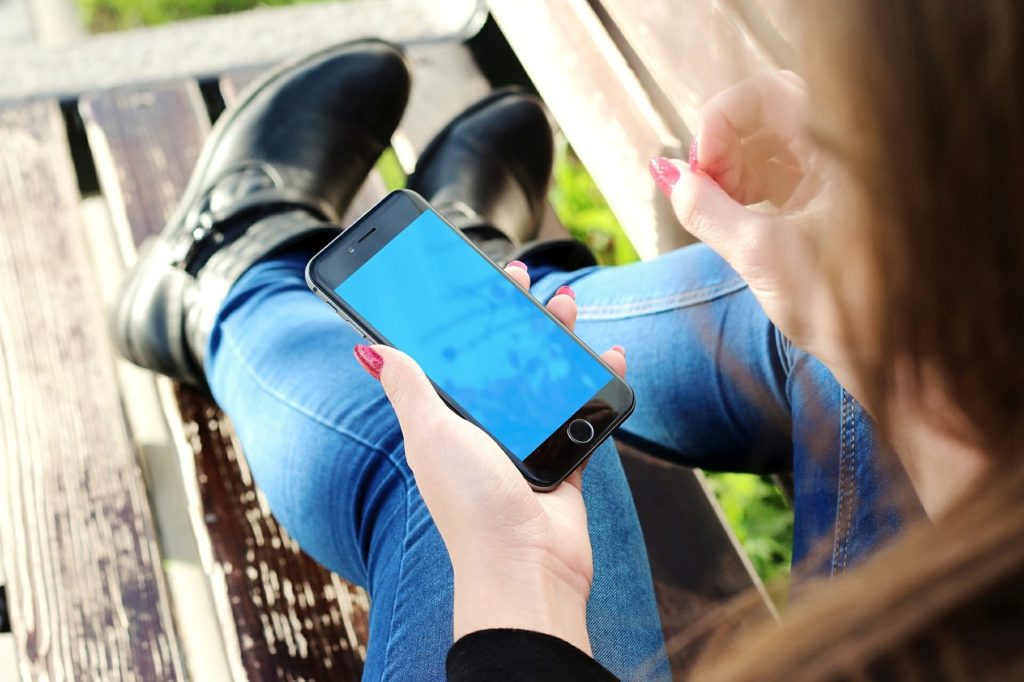- Calls to this hotline are currently being directed to Within Health or Eating Disorder Solutions
- Representatives are standing by 24/7 to help answer your questions
- All calls are confidential and HIPAA compliant
- There is no obligation or cost to call
- Eating Disorder Hope does not receive any commissions or fees dependent upon which provider you select
- Additional treatment providers are located on our directory or samhsa.gov
Social Media Moderation – Reducing Body Image Insecurities

Contributor: Kirsten Haglund, Community Relations Representative for Timberline Knolls and Founder and President of the Kirsten Haglund Foundation
I don’t like demonizing technology or any one social media platform. It is kind of like that black and white thinking that constricts behavior and thought and leads many down the path of restriction, extremes, and isolation.
Instead, it is vital that we look at technology – in whatever form – as a tool, that can be used for great harm, but also great good. Of course, that means I, the individual, have a lot more autonomy and more responsibility.
First, it is essential to acknowledge that harmful effects of social media exist; this is not mere supposition. A recent study by an Australian university found a direct link between Instagram and negative body-image among young women aged 18-25: “Greater overall Instagram use was associated with greater self-objectification…More frequently viewing fitspiration images on Instagram was associated with greater body image concerns…Together, these results suggest that Instagram usage may negatively influence women’s appearance-related concerns and beliefs. [1]
This follows a myriad other studies that conclude that time spent on social media platforms, that also includes Facebook, correspond with higher depression and anxiety among young people [2].
However, social media, due to its prevalence and proliferation, is also a tool that can be used to affect enormously positive influence and to create change in a meaningful direction. We must choose to see and use it this way.
We can harness the power of the ubiquity of social media to reduce body-image insecurity, rather than feed the monsters of cyber-bullying, comparison, and self-hatred.
Filter who and what you follow.
There are hashtags that exist across all platforms that aim to promote and celebrate shape and size diversity and unedited photos, some include famous women, some not. Examples include #bodypositivity, #nofilter, #uglyselfie, #nomakeup, #edwarrior, just to name a few.

Follow people and hashtags like this instead of the destructive ones and fill your vision with a more accepting and compassionate view of yourself and others.
Set a time limit.
This is difficult, but it is worth the effort. Choose a time frame that works for you to look at or check social media each day. Maybe it is 30 minutes in the morning or evening, or perhaps you decide that each time you pick up your phone to “check,” you’ll only stay on for two minutes or less.
Whatever boundaries you set for yourself, make sure to start practicing being aware of the time you spend on social media platforms, and limit it accordingly. It is incredible how much extra time you’ll find that you have!
Use that time away from the screen to engage with others, get out into nature, contemplate or daydream. It just might be more fun – and a lot more healthy.
Practice compassion for yourself and others.
You can be a force for good on social media by considering how and what you post. Are your photos and posts always positive? Do they accurately reflect your life? Try to be more authentic, or try not posting at all (there is no need to over-share, of course).

Encourage others. Stand up against cyber-bullies and call them out or report them. Light expels darkness, so shine brightly.
Social media can be a vehicle for destruction, but also for tremendous good. Inevitably, it is already shaping our culture and helps define the next generation who has grown up with its ubiquity as the norm.
However, there is no reason to be dismayed by this fact. Social media cannot doom scores of young men and women to isolation, depression, and self-hatred – only we can do that by not providing them with the skills, critical thinking, and motivation necessary to see how their influence online can be used for light rather than darkness.
Social media is here to stay, but we can co-opt the tool for our own purpose: to inspire real hope that brings beauty from ashes.

References:
[1] http://journals.sagepub.com/doi/pdf/10.1177/1461444817694499[2] https://edition.cnn.com/2017/01/12/health/girls-social-media-self-image-partner/index.html
The opinions and views of our guest contributors are shared to provide a broad perspective of eating disorders. These are not necessarily the views of Eating Disorder Hope, but an effort to offer a discussion of various issues by different concerned individuals.
We at Eating Disorder Hope understand that eating disorders result from a combination of environmental and genetic factors. If you or a loved one are suffering from an eating disorder, please know that there is hope for you, and seek immediate professional help.
Published on April 23, 2018
Reviewed on April 23, 2018 by Jacquelyn Ekern, MS, LPC
Published on EatingDisorderHope.com
